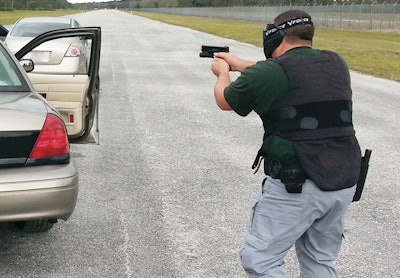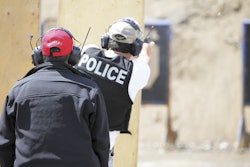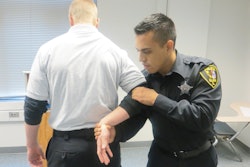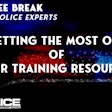 Photo: Amaury Murgado
Photo: Amaury Murgado
The principles of being a law enforcement officer have changed very little over the years, but the way we do business has. Law enforcement has become less people oriented in favor of high-tech solutions. Politicians and agency chief executives place a premium on officers and policies being politically correct. And as recent events have demonstrated, the ranks of people embracing an anti-cop agenda grow every day.
In order to survive this complex environment, we must have a complete understanding and thorough working knowledge of what I call the "seven essential components" of a successful law enforcement career.
Let me walk you through them in no particular order.
- Have a Thick Skin
As a law enforcement officer, you deal with situations that would make most people run away. And yet, those same people will turn around and get ugly with you. So you need to have a thick skin and not allow any of their button-pushing comments to get to you. I know it's easier said than done, but practice responding and not reacting.
To succumb to your raw emotions is to surrender to the very people who are trying to bring you down. You need to take the higher road and keep your cool. Remain firm, focus on your duty, and learn to recognize when someone is trying to play you so your reaction can be captured on video.
- Think Like a Wolf
We are sometimes referred to as sheepdogs protecting the flock. Though I appreciate the analogy, I prefer to think of myself as a wolf.
Like the wolf, we spend time operating alone and yet we also have to work with others. The wolf is both protector and predator. As protector, we keep those we serve and protect from harm. As predator, we hunt down those who would hurt (or have hurt) the people we serve and protect. Since perception is reality, I would rather project an image of a wolf to the criminal element than that of a sheepdog.
- Know Your Job
You have to know your job inside and out. There is no excuse for sloppiness or careless mistakes. Graduating the academy is but the first step in an ongoing learning process that will span your entire career. Times change and so do laws; leadership positions change and so do policies. That alone is reason enough to stay current on what you can and can't do. You should know your duties both assigned and implied and make good use of officer discretion. To do otherwise is to invite failure.
- Go All-In
Whatever tools you use, you should be very well versed in them. Most of your important law enforcement skill sets are diminishing in nature. If you don't use them, you will lose them.
You need to be crazy good with your handgun, shotgun, and rifle. You can't afford to be otherwise. One miss could alter not only your life, but the life of someone else. You also need to stay up on your control techniques.
Realize that being a cop is an all-in endeavor; any half-loaf effort is not acceptable. You can't wish yourself into success; you have to work hard at it. But having crazy skills is not limited to weapons or hands-on techniques. The same can be said for any skill you need in order to do your job. Knowing how to use your agency's database can be just as important in solving a crime as anything else.
- Know Your History
You need to know the history of the issues you are working. Things don't just pop up one day out of the blue. There is usually a string of events that led to the case you are working. In order to address the issue you need to know as many of the variables as possible.
As law enforcement officers we tend to deal in symptoms instead of root causes. Dealing with the cause will lead you to answers. A little more time up front studying the issue will lead to less time in trying to resolve it. This applies to regional, national, and international issues that filter down to you as well. Don't think your area is immune from any of it; the world is a much smaller place now. Conflicts aren't just because of simple neighborhood disputes anymore but may be rooted in long-term cultural or religious beliefs.
- Be Tactically Aware
The Internet and video games provide a wealth of training information for tactics and operational techniques that the bad guys can use against you. Instruction from the Islamic State (ISIS) for sympathizers around the world to rise up and commit jihad should also concern you. The recent beheading in a workplace in Oklahoma and axe attack on officers in New York confirm that jihadist attacks are a legitimate concern and we need to up our game and prepare to counter them.
How are you with tactics? Do you know your individual and team movements? Do you know the common tactics that might be used against you? It will benefit you to spend some time studying tactics (yours and theirs). Military small unit tactics manuals and books by John Poole such as "Tactics of the Crescent Moon" and "Militant Tricks" are a great start.
- Study Current Events
You need to stay up on local, regional, and national events. You need to know what's going on in your area and your surrounding jurisdictions. Crime knows no borders.
What this means for you is staying up to date on the news. It means reading your intel bulletins. It means signing up for free newsletters like those sent out by the editors of PoliceMag.com. You can also customize your search engine to highlight certain types of news. I get several email alerts from different sources. I also have a small network of retired military and law enforcement officers that share information with me. Considering you can get all this information for free, there is no excuse not to do it. What's happening around you affects what's happening to you.
Putting Them Together
Whether you agree with me or not, these seven keys to a successful career are important considerations for today's officer. We are expected to perform miracles and then get attacked for doing so.
No one is going to protect you so you have to protect yourself. The only way to do that is to know your job, train consistently, and perform your duties to the best of your abilities. Make it hard for anyone to sacrifice you and your reputation for the sake of political correctness. Become the protector and the predator and do the job. Whether you like it or not, you are the line in the sand.
Amaury Murgado is a special operations lieutenant with the Osceola County (Fla.) Sheriff's Office. He is a retired master sergeant from the Army Reserve who has more than 27 years of law enforcement experience, and has been a lifelong student of martial arts.













